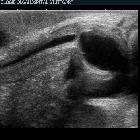Oligohydramnion

Newborn with
an amniotic fluid leak in-utero. CXR AP shows bilateral poorly developed and poorly expanded lungs.The diagnosis was oligohydramnios causing pulmonary hypoplasia.

Oligohydramnios
• First trimester oligohydramnios - Ganzer Fall bei Radiopaedia

Oligohydramnios
• First trimester oligohydramnios - Ganzer Fall bei Radiopaedia

Oligohydramnios
• Oligohydramnios - Ganzer Fall bei Radiopaedia

Oligohydramnios
• Autosomal recessive polycystic kidney disease - Ganzer Fall bei Radiopaedia

Oligohydramnios
• Multicystic dysplastic kidneys with oligohydramnios - Ganzer Fall bei Radiopaedia

Oligohydramnios
• Autosomal recessive polycystic kidney disease - antenatal - Ganzer Fall bei Radiopaedia

Oligohydramnios
• Echogenic fetal kidneys and megacystis - Ganzer Fall bei Radiopaedia

Oligohydramnios
• Asymmetrical intrauterine growth restriction with fetal distress - Ganzer Fall bei Radiopaedia

Autosomal
recessive polycystic kidney disease • Autosomal recessive polycystic kidney disease - antenatal - Ganzer Fall bei Radiopaedia
Oligohydramnios refers to a situation where the amniotic fluid volume is less than expected for gestational age. Often these fetuses have <500 mL of amniotic fluid.
Epidemiology
The estimated prevalence can be up to ~6% of pregnancies .
Pathology
Causes
The causes of oligohydramnios are protean and one way to simplify them is by using the mnemonic DRIPPC:
- D:
- demise
- drugs: e.g. prostaglandin inhibitors (indomethacin)
- R: renal abnormalities (from decreased urine output)
- I: IUGR (intra-uterine growth restriction): 80% may occur from decreased renal perfusion due to sparing effect
- P: premature rupture of membranes
- P: post dates
- C: chromosomal anomalies (especially if other anomalies are found)
Associations
- Potter sequence
- underlying fetal hypoxia and fetal cardiovascular compromise: from preferential flow to the fetal brain at the expense of diminished renal blood flow
- twin pregnancy-related complications:
- twin to twin transfusion syndrome: in pump twin
- maternal dehydration
Radiographic features
Antenatal ultrasound
Several sonographic criteria can be used which include:
- four quadrants amniotic fluid index (AFI): <5 cm
- two diameter pocket method: <1 x 1 cm or <15 cm
- maximum vertical pocket depth: <2 cm
Treatment and prognosis
Development of oligohydramnios early in pregnancy is generally a poor prognostic marker. Amnio-infusion can be attempted in severe cases if appropriate.
Complications
- first-trimester oligohydramnios can result in failure of pregnancy in up to 95% from complications such as
- pulmonary hypoplasia: implies a very poor prognosis
- fetal limb contractures
See also
Siehe auch:
- amniotic fluid index
- Pätau-Syndrom
- multizystische Nierendysplasie
- Lungenhypoplasie
- Polyhydramnion
- Trisomie 18
- einseitige Nierenagenesie
- Arthrogryposis multiplex congenita
- Urethralklappe
- Triploidie
- Intrauterine Wachstumsretardierung
- chromosomale Anomalien
- Potter-Sequenz
- Anhydramnion
- amniotic fluid volumes
- urethral atresia
- premature rupture of membranes (PROM)
- two diameter pocket method
- fetal hypoxia
- twin to twin transfusion syndrome (TTTS)
- preterm premature rupture of membranes (PPROM)
- Nierendysgenesie
- demise
- DRIPPC
- maximum vertical pocket depth
- post dates
und weiter:
- Hüftdysplasie
- obstetric curriculum
- Meckel-Syndrom
- fetal hydronephrosis
- cervical incompetence
- Trisomie 22
- Pena-Shokeir-Syndrom
- amniotic fluid volume
- PPROM
- Goldenhar-Gorlin-Syndrom
- sonographic values in obstetrics and gynaecology
- dysencephalia spanchnocystica
- fetal akinesia / hypokinesia sequence
- fetal infection
- Plazentainsuffizienz
- fetal biometric discordance
- asymmetrische intrauterine Wachstumsretardierung
- pre term premature rupture of membranes
- maximal vertical pocket method
- hypertensive states in pregnancy
- oligohydramnios (mnemonic)
- differential diagnosis of an absent fetal stomach on ultrasound
- fetale Megazystis

 Assoziationen und Differentialdiagnosen zu Oligohydramnion:
Assoziationen und Differentialdiagnosen zu Oligohydramnion:Arthrogryposis
multiplex congenita
preterm
premature rupture of membranes (PPROM)










